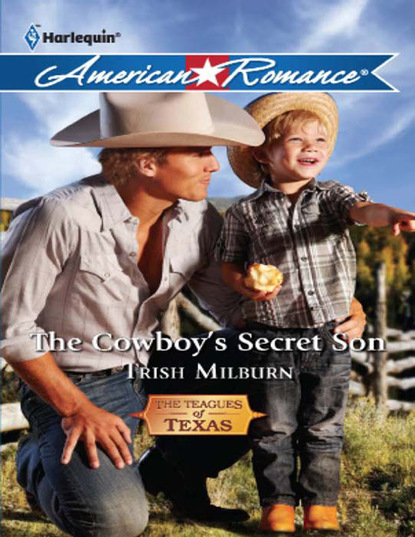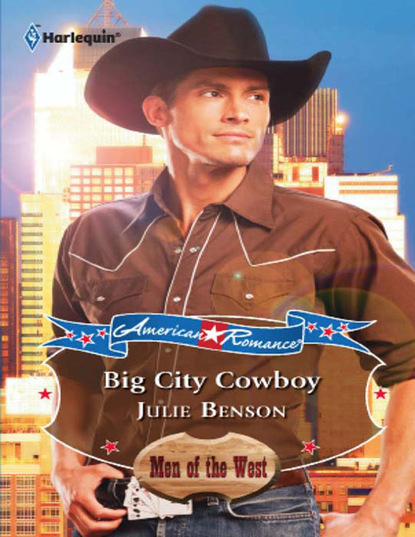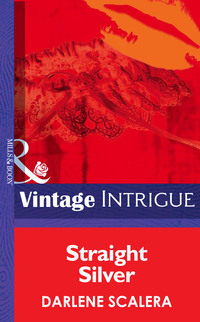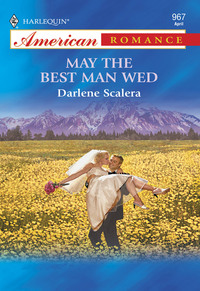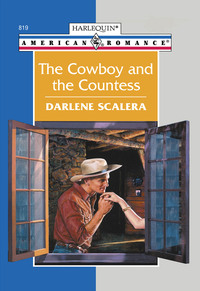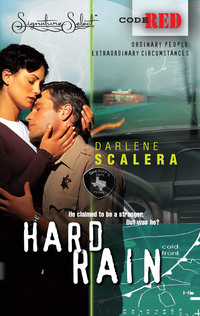
Полная версия
Prescription For Seduction
“Mom!” Anna shook her head, the evening light blending the gray in her dark hair.
“What? No more single Spencer men in Tyler?” Brady smiled. “The place would become a ghost town.”
“No more single Spencer men in Tyler?” A glint had appeared in Martha’s blue eyes. “Are you telling me something I don’t know about your father and Lydia Perry?”
Brady eyed the elderly woman. “Is there something I should know about my father and Lydia? The Quilting Circle hasn’t started a new quilt, have they?”
Martha studied him as if trying to determine if he was teasing or serious.
“Brady, did Quinn and Molly tell you how much my grandson, Jeremy, adores Sara?” Anna diplomatically changed the subject. “They’re inseparable at Kaity’s Kids.”
Brady’s smile widened at the mention of his brother’s new wife and her daughter. “I agree with Jeremy one hundred percent. Sara is a charming child. Pure adorable.”
“And it won’t be long before Seth and Jenna will be bringing new little ones to the Spencer Sunday dinners, will it?”
Brady nodded. “Jenna is due in May.”
“Imagine, twins.” Anna shook her head again.
“Humph,” Martha sounded. “Elias will never be the same.”
Brady had to agree. Everything was changing. After many years, the somber Spencer family home stretching along Maple Street was again hearing the sound of children’s laughter, the song of women’s voices.
Martha’s gaze remained on Brady. “So, why aren’t you dating anyone, Doc?”
“I’m dating, Martha. As much and as many as I can.”
The old lady smiled slyly. “Spring is in the air, Brady Spencer.” She gestured toward the flowers displayed in The Garden of Eden’s front windows. “Good time to stop and smell the roses.”
He looked at the flowers in the soft light, thought of Eden’s thin, white hands arranging them until they were even more perfect. Past the shop windows it was dark except for the fish tank’s purplish glow and the low light from the cooler. Eden must’ve gone up to her apartment over the store for the night.
“Eden’s a good girl, isn’t she?” Martha asked. He stepped back from the window, but it was too late. His study of the store hadn’t gone unnoticed by the old woman.
He carefully composed his reply. “She seems like a nice person.”
Martha’s eyes narrowed. “You know her, don’t you?”
“Sure, everybody knows Eden.”
Martha tilted her head back, her gaze gaining new power. “She could be easy to overlook. She’s not flashy and noisy like some I’ve seen. She’s the kind of girl that lets a man hear the sound of his own breath.”
“Mom,” Anna interrupted, “we’re keeping the good doctor from his work.” She again smiled apologetically at Brady.
Martha’s gaze never left Brady. “I think I’ll keep an eye on you, Doc.”
Brady knew the elderly woman’s sharp tongue protected a soft heart. He knew because it was a tactic he himself had mastered. “If somebody’s got to, Martha, I’m glad it’s you.” He leaned over and kissed the woman’s cheek, felt the precarious thinness of flesh.
He stepped back, concealing his own surprise at his behavior. Martha touched her cheek, but snorted with indignation. “It should be someone with a lot fewer years and a lot more agreeable. Someone like—”
“C’mon, Mom.” Anna hooked her arm through her mother’s. “If we don’t get you back by bingo, the home will be calling in Deputy Cooper. Nice seeing you, Brady.”
“You too, Anna. Tell Johnny I said hello.”
“Can I tell him you said he should go easy on those onion rings when the Dairy King opens for the season next month?”
With relief, Brady returned to his professional role. “With his hiatal hernia, the chili dogs, too.”
Anna glanced at Martha. “And maybe egg substitutes and a little less bacon for Mom at those Sunday breakfasts at the diner? Her last blood workup showed her cholesterol was high.”
“Couldn’t hurt.” He looked at Martha. “No sense courting heart disease.”
“If you’re in such a big hurry to get me home, why are we still standing around here flapping our jaws?” Martha snapped at her daughter.
“No wonder he’s not settled down yet,” the old woman was still grumbling as she and Anna crossed to the square. “He’s too busy making sure the good citizens of Tyler live long, unhappy lives.”
Brady watched the women walk away. Even after they disappeared behind the oak trees, he stood, trying to figure out what had prompted his sudden show of affection. He wasn’t one given to spontaneous gestures…until lately. He shook his head. At times he didn’t understand himself anymore.
He looked up. The windows above the flower shop were covered with lace, the light past them tinted pearl-pink. He took a deep breath, swore he smelled heaven once more before he started toward the hospital.
The security guard glanced up as the double glass doors to the hospital’s main lobby slid open. The regular entrance to the brick annex where most of the doctors had their offices was locked after hours to save on security costs. The guard nodded at Brady. “Thought your day was done, Doc.”
Brady only had to say one word. “Paperwork.”
The guard nodded again. “The modern man’s burden.”
“You have a good evening now.” Brady headed down the corridor. His encounter with Martha had scared him off small talk for the night.
The hall was windowless, lit by fluorescent tubes in the ceiling that made shadows seem to disappear and turned faces hard. He said hello as he passed a cleaning lady. The floor was bland asphalt tiles. The walls were a faded mauve.
He turned into another, shorter hall that led to a tunnel connecting the smaller professional center to the hospital. At the tunnel’s end, he took the stairs to the second floor. He inserted his key card into the door and went into the empty waiting room. He passed reception, the records room, examining rooms, the offices of the other doctors in the practice before coming to his own. He unlocked the door, seeing the charts piled on top of the corner file cabinet. Several white lab jackets on wire hangers hung from the coatrack next to the cabinet. The blinds were drawn. Beneath the room’s only window was a sofa he’d never rested on.
He set down his briefcase and grabbed a handful of charts. Sitting at his desk, he took a microcassette recorder and some pens and pencils out of the top drawer.
He looked at the charts before him and heaved a deep breath. Heaven was gone. Here, even behind the office’s closed door, he could only smell the bitter scent of sickness, the false lemon of antiseptic.
He’d thought he would get used to it. He never had. Each time, whether in his office or the operating room, it was still a shock—the compressed smells, the soundless slice into skin, the easy break of bone. It scared the hell out of him. But what had scared him the most was his own fear—the feeling of being vulnerable, not in control. And so, he’d had no choice but to specialize in surgery.
He opened a chart but didn’t look at it. The walls of his office were the same nonthreatening color as throughout the hospital. The lighting was surreal. The linens in the exam rooms and everywhere else were an innocuous white. The beds were metal. The gowns were thin and fashioned to expose.
He thought of the flower shop with its color, its life, and suddenly he longed for its quiet. It wasn’t the eerie quiet of the hospital but a calm, content silence. A quiet one would imagine to be in the paradise The Garden was named after.
He’d gone there on a whim. That had been the beginning, the first spontaneous act in an otherwise orderly life. It had been the soulless month of February. He’d been walking home, tired, frustrated, wondering if there was a world where there were no Februarys. He’d been thinking of a patient, a woman all alone, old, frail, arthritis ballooning her fingers, curving them at odd angles so that even holding a cup became a feat.
She’d come in with a hip fracture and her whole life in a worn black leather pocketbook. Her history showed several ministrokes. She’d be transferred to a nursing home as soon as a bed opened up. All day, through rounds, meetings, consultations, Brady had thought of that woman, sitting alone in her thin-mattressed bed, staring, her mauve walls bare as she moved more toward death than life. They’d done all they could for her medically. Still he’d wanted to do more. Some would say he did enough every day with his prescriptions and sutures and killer smile. For him, it wasn’t enough any longer.
That evening he’d walked the few blocks from the hospital to home, passing The Garden of Eden. In the front windows there’d been flowers from winter-whites and palest pastels to summer brights and heady deep tones the color of ecstasy. He’d stopped. He wasn’t sure why. Maybe it was the lipstick-red so startling at the ends of the tulips’ yellow petals. Maybe it was the spray of baby’s breath like the first snow. Maybe it was nothing more than to stand somewhere and see only color and life. He had no reason, but he went to the door. Just to look around inside a few minutes, he had told himself as he’d turned the knob. It had been locked, but as he turned to go, the door had opened. Eden had seen him at the windows and had unlocked the door. Finally he was inside, his steps too quick, the charcoal-gray of his suit too drab. Yet the scents lured him, kept him long. And there’d been Eden with her own soft style and extraordinary eyes. She had said a few words in her quiet way, then leaned toward him as if only wanting to listen. And he, who never revealed, had told her about the elderly patient alone in the empty, faded room. By the time he’d left, he’d ordered an extravagant arrangement to be sent anonymously to the woman. He’d also felt better than he could ever remember.
The next day he’d stopped by the shop again after hours and had another lavish bouquet sent to the woman, then another and another, filling her room with flowers until even the other patients, visitors and nurses stopped as they passed and sighed with pleasure.
The woman had died at the end of the week—pneumonia complications—but Brady knew she had died surrounded by life and color and beauty and the thought that somebody cared. She hadn’t died like his mother, her smile not being seen again by those who needed to see it most.
Now Brady sent flowers almost every other day. There was always someone alone or sick or with a heavy heart. The deliveries were never signed. The flowers were always ordered after hours. Brady wouldn’t jeopardize his patients’ confidence or the hospital staff’s respect by being anything other than the strong, sensible, self-sufficient surgeon they expected. He had learned at the age of eleven never to expose your weaknesses. And he never had…until he’d gone to Eden.
Chapter Two
Cookies. Brady smelled cookies. Mixed in with the rose and the lavender, the sandalwood and the gardenia, there was cinnamon, melting sugar and a richness so dense, the air around him seemed thick.
“Eden,” he called, his voice sounding slow and full in the fat air.
“Hello, Brady.”
He looked to the right, past the deep stainless steel sink and the crowded shelves to the stairs that led to the second floor. On the landing two big fuzzy bumblebees, their antennae bobbing, greeted him. From the whimsical slippers, Eden’s thin, bare legs stretched up like lollipop sticks into baggy shorts beneath an oversize cotton shirt. Her hair was pulled back, twisted up high and tight into a knot, except for two ends that had broken free. They stuck up like the rabbit ears children sneak behind another’s head in a photo. She came down the stairs fast and, at the bottom, paused, panting. She smiled, a faint pink in her cheeks and her eyes the deep purple of dawn. He wanted to kiss her so badly, he could almost taste her like the promise of cookies that came down the stairwell. He wanted to take her right there on the softly lit stairs with the swirl of smells around them.
Great. He’d gone from leering at Eden to seeing her stretched out, waiting for him on the staircase. Guilt grabbed him, gave him a hard shake. Shame came next. This was Eden—sweet, awkward Eden who taught the ladies auxiliary how to make balsam wreaths for the Christmas bazaar and made sure Guy Teator, the oldest resident of Worthington House but still the snappiest dresser in Tyler, always had a fresh boutonniere, free of charge.
She was in no way the type of woman that normally drew his attention. He preferred a more sophisticated type of woman. A woman with more curves, with artfully curled hair and carefully chosen clothes. A worldly, ambitious woman who enjoyed a relationship based on mutual respect and physical pleasures. A woman who didn’t expect a long-term commitment.
Eden wasn’t that type of woman.
He saw her spindly legs, her knees as he’d imagined, hard and round as apples picked too early. No, Eden was the opposite of the woman he usually dated.
Eden was the type of girl who’d fall in love.
He was staring again. Eden looked at her oversize bee slippers. Could she blame him? Had she really imagined desire in those jade green eyes? This had to stop. She had to stop.
Yet she said, “I baked cookies.”
“I shouldn’t have come.” He spoke in the tone of a man who was listened to, but he was leaning on the edge of the sink where the flowers were processed. “It’s too late. I’ve kept you up.”
“They’re oatmeal chocolate butterscotch.” A buzzer sounded from the second floor. “Oops, there’s the timer.” She turned and trotted up the steps. Brady hesitated, then followed those fuzzy yellow feet up the stairs.
The door at the top opened into a blue and white kitchen. Cookies cooled on the counter, the heat and smells welcoming him as if he’d come home.
Eden switched off the timer and opened the oven door. More heat and smells came like a child’s hungry dream, and, at that moment, Brady couldn’t think of anything more wonderful than warm oatmeal chocolate butterscotch cookies.
Eden straightened, the cookie sheet in her gloved hand, her face flushed, her eyes bright from the heat. He’d seen a similar look on women before, but they hadn’t been baking. They’d been in his bed.
He looked away. He was irredeemable. There was only one thing that could save him, that had always saved him. He looked at Eden. “Can I help you?” he asked.
“Yes.”
He was saved.
“You can sit down and eat as many of these cookies as possible before I do.” She blew at a strand of hair that had fallen across her forehead and smiled at him.
He saw the rows of cookies cooling on the wire racks. Since lunch he’d only had three large cups of black coffee and a cranberry juice grabbed off a nutrition cart on its way to the floors. He took off his suit jacket, hung it evenly across the kitchen chair’s high back. “I could do that.”
She set a ceramic plate piled with cookies in the center of the round table and a smaller matching plate before him. “Something to drink?”
He leaned back, a content man. Her hand, covered with the oversize pot holder, jerked away from the back of his chair where it’d been resting. He glanced up at her.
She looked at him with her dark-violet eyes and her delicate smile. Her hand covered with the plaid pot holder was now gripping the other, bare one.
“Tea?” she offered, taking another step back.
He hated tea. “Tea would be great.” He pushed back his chair. “But let me help you.”
“No, no.” Her hands flew apart and patted the air above his shoulders. “You sit.”
She moved about the kitchen, filling the bright-red teakettle and setting it back on the stove, opening the stenciled cupboard, standing on her tiptoes and reaching up to the tea boxes on the upper shelf.
“Let’s see, I’ve got orange pekoe, cinnamon apple, peppermint…” She looked over her shoulder at him.
“Whatever you prefer.”
Her gaze moved to his empty plate, then back to him. “Eat, Brady.” Her voice was low and coaxing; her smile quiet. She waited until he reached for the cookie plate before turning back to the tea boxes.
“Mmm, orange pekoe, I think.” She opened another cupboard, took out two brightly colored mugs, shook a tea bag into each. On the stove, the kettle steamed.
Brady looked around the tiny kitchen as full of colors and patterns and shapes as the store below. Hand-painted plates hung on one wall. A vine was about to flower on the scalloped shelf above the sink. More flowers twined on a grapevine arched above the door and poked from the terra-cotta pots scattered around the room. Home Sweet Home was stenciled on the dish towels that hung from the oven door handle. Through the doorway that led into the next room, he saw peach-colored walls and a framed Norman Rockwell print. Eden was humming. She set a ceramic cow milk pitcher and a matching sugar bowl on the table. Next to them she placed a plastic bear of honey.
“Or do you prefer lemon?” she asked.
Definitely the marrying type. He shook his head. The uneaten cookie still waited in his hand.
A fat tangle of fur sauntered in from the next room.
“There you are, Penelope.” Eden set a steaming mug smelling of orange and cloves in front of Brady. “Come and say hello to Dr. Spencer.”
The cat stopped in the doorway and stared at Brady, as if reading his every thought.
“So…” Eden sat at the table, her mug cupped in her hands. “You had a late emergency?”
He nodded. The cat stared at him, its pupils narrow. The cookie was going cold in his hand. He took a bite and was ruined forever for any baked goods that came cellophane wrapped.
He finished the cookie in two bites and reached for more. He saw Eden watching him. “These are great.”
“Thank you.” She dropped her gaze, blew across the tea’s surface, but Brady could see she was smiling. She glanced up. The tiny smile was still there. “Have some more.”
Brady chewed. Definitely the marrying type. He glanced at the cat eyeing him. The cookies stuck in his throat. He picked up the mug beside his plate and took a large sip. He hated tea.
Eden lifted her own mug and sipped. “Good, huh?”
He swished the liquid in his mouth and gulped it down. “Delicious.”
Her smile widened, the corners of her eyes lifting. The steam from the cup warmed her face, made her eyes gleam. She had flawless skin, smooth as cream, meant to be touched.
He took a big bite of cookie and focused on the flavors blending in his mouth. He refused to look at Penelope.
“Was it very serious?” Eden asked. “The emergency?”
“Appendectomy. Routine procedure,” he said through a mouthful of cookie, “but the patient had been taking aspirin all day for the abdomen pain, and his blood was thinned out. Gave us some trouble clotting, but we got it under control. It just took a while longer.”
He took a bite of cookie and chewed. “You know…” He pointed the cookie at her. “You could take over the world with these cookies.”
She tipped her head back and laughed. She didn’t often laugh so loud and full. Not that she was grim. Not at all. It was just that silent smiles were more her style. This was nice, Brady decided, sitting here in this cozy kitchen, eating homemade cookies, listening to the sweet sound of Eden’s laughter.
“I mean it,” he said. “One bite would make the mightiest, meanest men your slaves.”
Her laughter continued. He watched it ripple up her throat’s long length, thinking how white and tender the skin was there.
His thoughts were interrupted by a soft, warm weight landing in his lap. “What the—?”
“Penelope, where’s your manners?” Eden scolded. “Get down off Dr. Spencer this minute.”
Staring up at Brady, Penelope blinked her wide-set eyes once and plopped dead center in his lap.
“Penelope Maybelle Patterson.” Eden sprang up, clapping her hands as she rounded the table. Penelope gave Brady one final slitted look, then slid off his lap.
“Shame on you. Getting cat hair all over Brady’s expensive suit.” Eden swiped at Brady’s pant legs.
One brush of her hands across the length of his thighs and he felt the low, beginning heat of desire. He looked at her. Penelope stared at her, too.
Realizing the intimacy of her touch, Eden stopped. Her face colored. As she straightened, she met Brady’s stare and froze, her color deepening.
He smiled the smile used to reassure anxious patients. “You surprise me, Eden.”
“I do?” It was a whisper, her vivid-colored eyes wide.
“Do you give all your pets full names?”
A smile started. “Don’t you?” She went back to her seat. A little more of her smile returned, but when she picked up her tea, she had to grip the mug with both hands.
“Except for the occasional frog or lightning bug, I never had any pets.”
“None?”
“Seth had a collie once when we were young, but it got loose and ran away. About a week later my dad was driving us to the fishing derby up at Timber Lake, and we saw the collie lying on the side of the road. A car had hit him.” His gaze moved past her. “We never had any more pets after that.”
He picked up his mug and took a sip. He really hated tea.
“I didn’t have any brothers or sisters.” Eden was still holding her mug too tightly. “For my parents, after twenty-two years of trying to have children without success, I was a total surprise. A nice one, they always assured me, but after all that time when it’d only been the two of them, I definitely disrupted their lives. Anyway, I guess I always thought of my pets as real people, the brothers and sisters I’d never had.”
Brady thought of his own brothers, how close they’d always been—especially after their mother had left them. Not that they ever talked about what happened. Their father had forbidden it. There’d been twenty-three years of silence until a few months ago when his father had relented and given Cooper Night Hawk permission to look into his wife’s whereabouts. It was Coop who had found out Violet had died in childbirth seven months after she ran off with another man.
Brady looked into Eden’s eyes and cleared his throat. “I guess I should order the flowers I want to send.”
She straightened the platter of cookies, pushing it closer to him. “There’s plenty of time. Have another cookie.”
He picked up a fifth cookie.
“Let me get you a fresh cup of tea.” She reached across the table for his mug. “Maybe cinnamon apple this time?”
He saw the concern in her extraordinary eyes. “That’d be great.” The words were out of his mouth before he could stop them, his behavior once more surprising him. It wasn’t an unpleasant surprise though. He didn’t even want to analyze it. He only wanted to watch Eden as she moved around the kitchen. Her face was still tinged with pink, and soon she was humming again. Not an unpleasant surprise at all.
She turned on the burner under the kettle and came back to the table. She looked at him, her hands grasping the edge of her chair. “We’ll sit and drink some tea, eat some cookies, and you can tell me all about your day.”
WHICH WAS PRECISELY what he did, Brady thought as he walked to the hospital the next morning. It had been almost midnight by the time he’d left Eden’s and returned to his condo. He’d slept like a drunken man. Too much sugar, he’d decided.
He sidestepped a puddle. The temperatures had stayed defiantly warm, reducing winter to no more than black patches of soggy soil or an occasional wet stain on the sidewalk. The birds had come home. Women once again wore skirts and short-sleeved shirts baring long stretches of skin. The men walked slower, steadier. Even Brady’s steps this morning weren’t the usual military march but almost approached a stroll. He’d decided to take the long way around the town square. When he spied Cooper coming out of Marge’s Diner, a scowl on his face, it didn’t seem possible anyone could be unhappy on this sun-warmed morning.
“Coop.”
The town deputy turned, his natural Native American looks made even more dramatic by his brooding expression. He was considered a fourth son to the Spencer family not because of his physical looks but because of the strong emotional bonds between him and the Spencer men. Seeing Brady, he smiled. Still his dark-brown eyes were somber.


